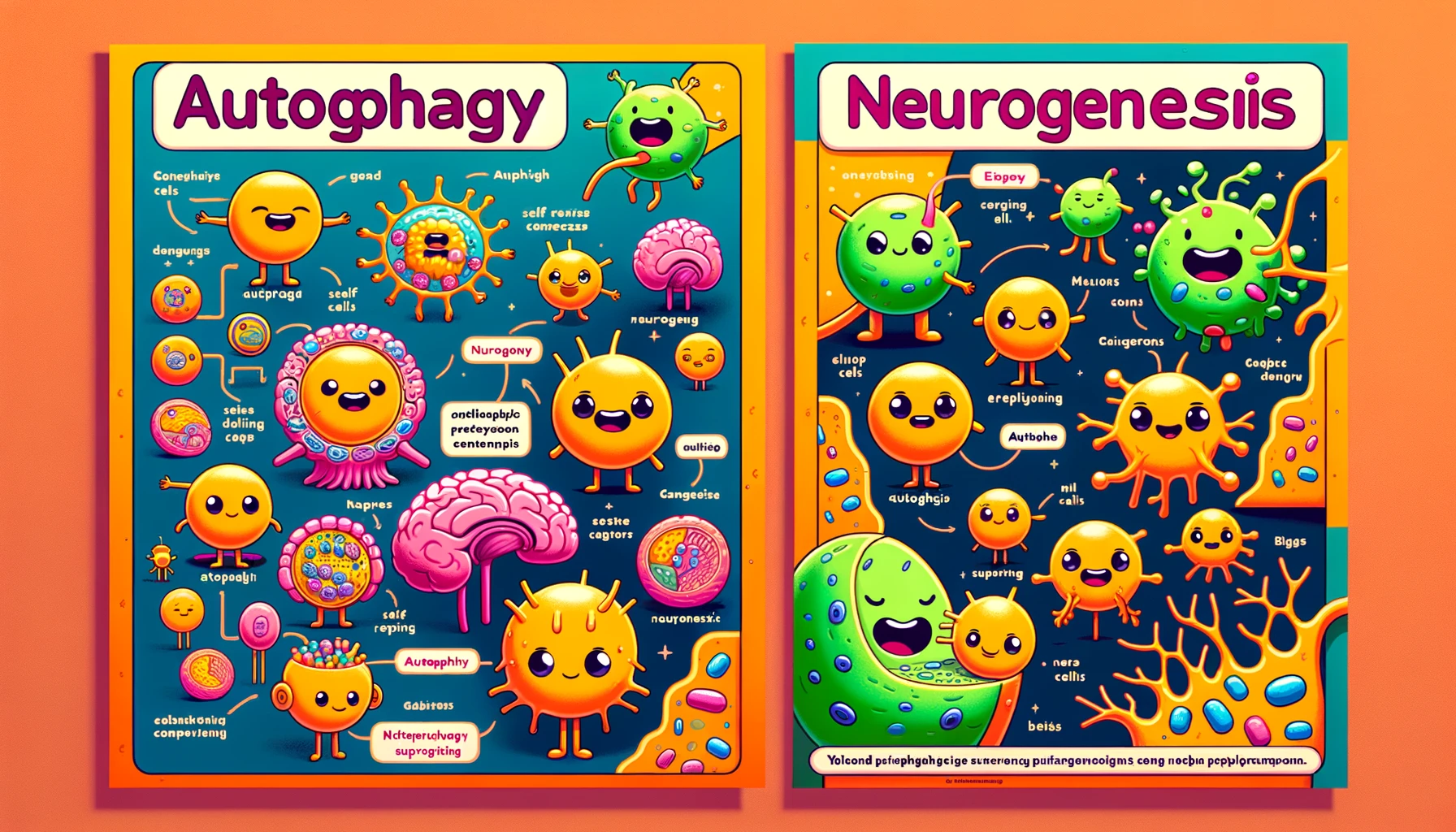Autophagy Vs Neurogenesis Understanding Their Differences and Roles
Autophagy Vs Neurogenesis Understanding Their Differences and Roles
Table of Contents
- Introduction to Autophagy and Neurogenesis
- What is Autophagy?
- What is Neurogenesis?
- Functions of Autophagy
- Functions of Neurogenesis
- Autophagy vs. Neurogenesis: Key Differences
- Importance of Autophagy
- Importance of Neurogenesis
- Factors Influencing Autophagy
- Factors Influencing Neurogenesis
- Conclusion
- References
Autophagy vs. Neurogenesis: Understanding Their Differences and Roles
Introduction to Autophagy and Neurogenesis Autophagy and neurogenesis are two critical cellular processes that play essential roles in maintaining overall health and brain function. Autophagy involves the degradation and recycling of cellular components, while neurogenesis refers to the generation of new neurons. This article explores the differences, functions, and importance of autophagy and neurogenesis, highlighting how they contribute to health and disease prevention.
What is Autophagy? Autophagy, derived from the Greek words “auto” (self) and “phagy” (eating), is a cellular process that involves the degradation and recycling of damaged or unnecessary cellular components. It is a vital mechanism that helps maintain cellular homeostasis and function.
Mechanism of Autophagy
The process of autophagy involves several steps:
- Initiation: Autophagy is triggered by various signals, such as nutrient deprivation, oxidative stress, and the accumulation of damaged proteins.
- Formation of Autophagosomes: Double-membrane vesicles called autophagosomes form around the targeted cellular components.
- Fusion with Lysosomes: Autophagosomes fuse with lysosomes, which contain digestive enzymes that break down the enclosed material.
- Degradation and Recycling: The degraded components are recycled and used to generate new cellular components or as an energy source.
What is Neurogenesis? Neurogenesis is the process of generating new neurons from neural stem cells and progenitor cells. This process occurs primarily in two regions of the adult brain: the hippocampus and the subventricular zone.
Mechanism of Neurogenesis
The process of neurogenesis involves several stages:
- Proliferation: Neural stem cells divide and produce progenitor cells.
- Differentiation: Progenitor cells differentiate into immature neurons.
- Migration: Immature neurons migrate to their designated locations within the brain.
- Maturation: Immature neurons mature into functional neurons and integrate into existing neural circuits.
Functions of Autophagy Autophagy serves several essential functions within the cell:
- Cellular Cleanup: Removes damaged organelles, misfolded proteins, and pathogens, preventing their accumulation and promoting cellular health.
- Energy Production: Recycles cellular components to produce energy, particularly during periods of nutrient deprivation.
- Cellular Homeostasis: Maintains cellular homeostasis by regulating the turnover of cellular components.
- Disease Prevention: Protects against various diseases, including neurodegenerative diseases, cancer, and infections, by removing damaged components and reducing inflammation.
Functions of Neurogenesis Neurogenesis plays a crucial role in brain function and overall health:
- Learning and Memory: The generation of new neurons in the hippocampus is essential for learning and memory formation.
- Mood Regulation: Neurogenesis in the hippocampus has been linked to mood regulation and the alleviation of depression.
- Brain Plasticity: Contributes to brain plasticity, allowing the brain to adapt to new experiences and recover from injuries.
- Cognitive Function: Supports overall cognitive function, including problem-solving, decision-making, and spatial navigation.
Autophagy vs. Neurogenesis: Key Differences
- Primary Function: Autophagy is primarily involved in cellular cleanup and recycling, while neurogenesis is focused on generating new neurons.
- Process: Autophagy involves the degradation and recycling of cellular components, whereas neurogenesis involves the proliferation, differentiation, migration, and maturation of new neurons.
- Location: Autophagy occurs in all cell types throughout the body, while neurogenesis is predominantly observed in specific regions of the brain.
- Role in Health: Both processes are crucial for maintaining health, but they contribute differently. Autophagy helps prevent diseases by removing damaged components, while neurogenesis supports cognitive function and brain plasticity.
Importance of Autophagy Autophagy is essential for maintaining cellular health and preventing disease:
- Neurodegenerative Diseases: Autophagy helps remove misfolded proteins and damaged organelles that contribute to neurodegenerative diseases such as Alzheimer’s and Parkinson’s.
- Cancer: Autophagy can suppress tumor development by removing damaged cellular components, although it can also promote cancer cell survival in established tumors.
- Infections: Autophagy plays a role in the immune response by degrading intracellular pathogens.
Importance of Neurogenesis Neurogenesis is crucial for maintaining brain health and function:
- Learning and Memory: Essential for the formation and retention of new memories.
- Mood Regulation: Reduced neurogenesis has been linked to depression, and enhancing neurogenesis can improve mood.
- Recovery from Brain Injury: Supports brain repair and recovery following injury or stroke.
Factors Influencing Autophagy Several factors can influence the rate and efficiency of autophagy:
- Diet: Fasting and calorie restriction can stimulate autophagy.
- Exercise: Regular physical activity promotes autophagy.
- Stress: Oxidative stress and cellular damage can trigger autophagy.
- Aging: Autophagy efficiency declines with age, contributing to age-related diseases.
Factors Influencing Neurogenesis Neurogenesis can be influenced by various factors:
- Physical Exercise: Regular exercise stimulates neurogenesis in the hippocampus.
- Diet: A diet rich in omega-3 fatty acids, flavonoids, and antioxidants supports neurogenesis.
- Mental Stimulation: Engaging in mentally stimulating activities promotes neurogenesis.
- Stress: Chronic stress can inhibit neurogenesis, while reducing stress can enhance it.
Conclusion Understanding the differences and roles of autophagy and neurogenesis is crucial for appreciating how these processes contribute to overall health and disease prevention. By supporting autophagy and neurogenesis through lifestyle choices such as diet, exercise, and mental stimulation, individuals can promote cellular health, cognitive function, and overall well-being.
<ⓒ WizardMedics (wizardmedics.com)>







